Foggie Max IO
Data Sovereign DePIN Server
Effortlessly secure and monetize your real data on the blockchain, gaining immediate DMC rewards. Foggie Max IO guarantees utmost privacy and autonomy over your Mac, IoT, and security data through advanced decentralized Dapp integration.
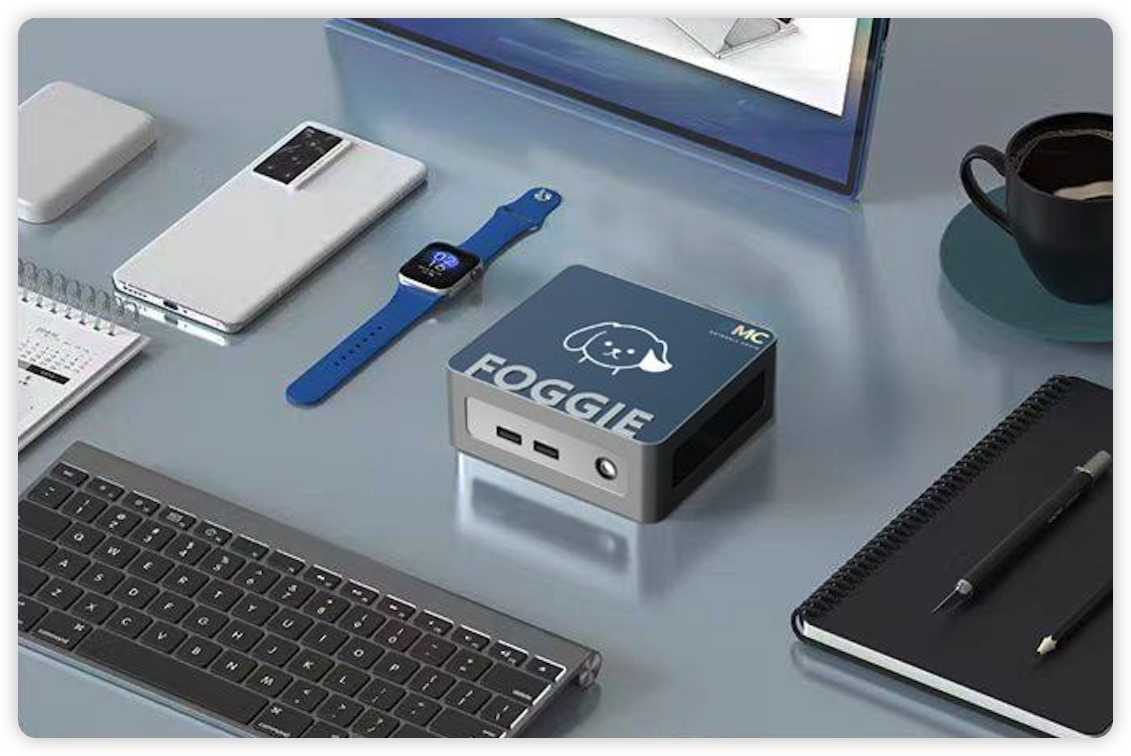
Why Choose Foggie Max IO?
- Compact Yet Spacious: A sleek design packed with extensive storage, ensuring your privacy and full control over your data.
- Decentralized Power: Access powerful decentralized applications that prioritize your data’s privacy.
- Pioneering DePIN Technology: Experience the world’s first truly scalable DePIN server, leading the way in innovation.
- Lucrative DMC Rewards: Effortlessly collect and deploy data for significant returns.
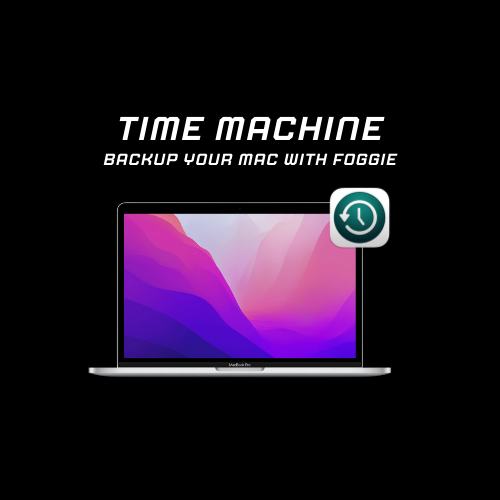
Seamless Mac Backup
Foggie Max Can:
- Automatically backup your files on your Mac;
- Enjoy incremental backups—hourly for 24 hours, daily for a month, and weekly for older data.
- Easily restore specific files or your entire system from any point in time.
Earn DMCX in Multiple Ways
Earn rewards by sharing extra storage capacity with the Foggie Network.
Every Foggie Max comes with 1TB/4TB solid-state drive (SSD). Foggie Max can automatically list your idle storage capacity on the Foggie Network and help you earn DMCX even while you sleep.
Upload and share your public content to Foggie Max to earn DMC.
When you upload public photos, videos, IOT device & other files to your Foggie Max and share them with others, you can also earn $DMC.
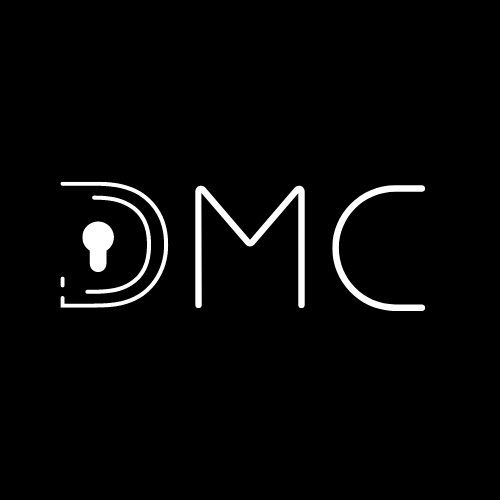

Data Privacy Guardian: Integrating IoT Devices
- Home Integration: Seamlessly connect with your home’s IoT devices, enhancing convenience and control over your smart environment.
- Enhanced Privacy: Secure your private spaces with enhanced protection for sensitive data, such as video surveillance footage, ensuring your privacy remains intact.
- Data Ownership: Our cutting-edge protocols affirm your personal data’s sovereignty, guaranteeing that you have exclusive ownership and control.
Make Your Data Disaster-Proof
- Cutting-edge data protection
- Off-site backups
Configure automatic off-site back-ups to other Foggies in the Foggie Network, not to a centralized, third-party cloud - Secure: all back-ups are fully encrypted
- Guaranteed privacy
You won’t know whose Foggie Max your back-ups are stored on. Conversely, other Foggie Max owners won’t know whose data is stored on their devices.


Filecoin Station Intergration
The station connects your Foggie Max’s idle resources to the Filecoin network and rewards you with FIL.
Exclusive Ecosystem Airdrop
Users gain access to airdrops and other rewards from Fog Works’ ecosystem partners, adding extra value to the device.

Mint NFTs & Monetize Your Data
- Create a permanent URL for your digital assets
- Avoid censors — all public content you save to your Foggie Max becomes unblockable
- Reduce digital piracy — you’re permanently recorded as the creator of every original file saved to your Foggie Max
- Mint NFTs in bulk with no code and low gas fees
- Every Foggie Max owner can feature their digital assets on a fully decentralized content sharing marketplace
- Get likes and tips for your digital work, sell your digital assets for a fixed price or auction, and retain copyright
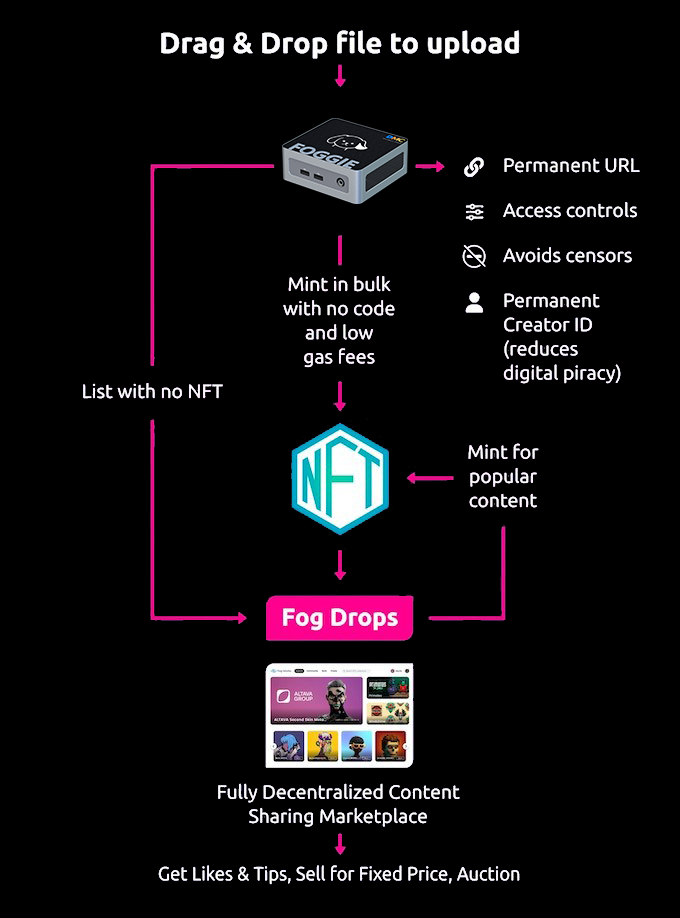
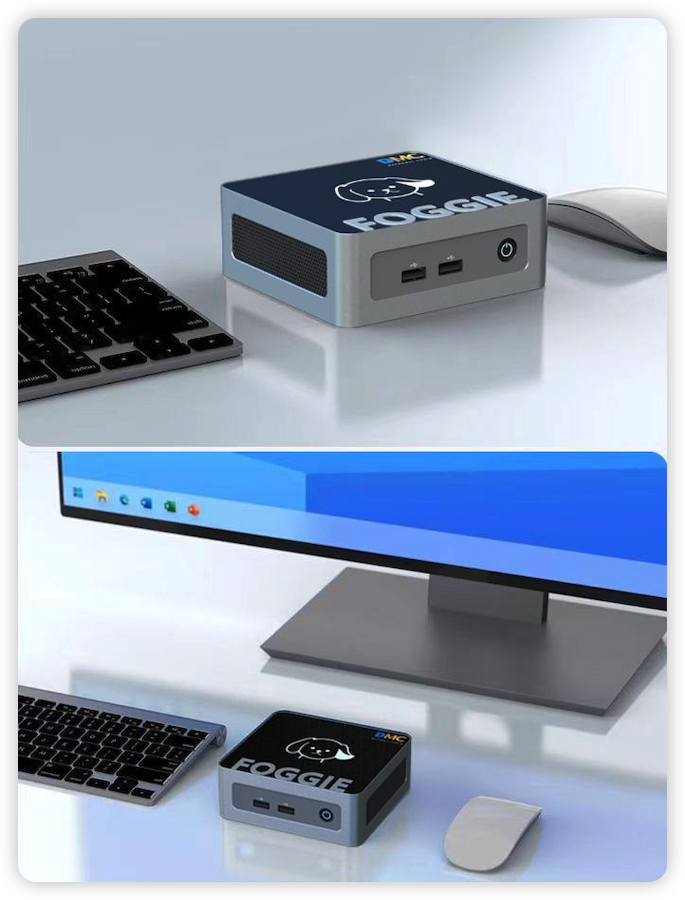
Download Untra-Private Apps & Use Them Forever
Improve your privacy by saving the you generate to your Foggie Max
Foggie Max dApps don’t connect to centralized cloud services. No spying on your app-related activity. All data generated by your apps will be saved to your Foggie Max, not to a third-party cloud. Which means unprecedented privacy.
Eliminate discontinued and deactivated apps
dApps saved to your Foggie Max can’t be deleted, deactivated, or discontinued. The only infrastructure they need to run is your Foggie Max.
Eliminate monthly fees (and changes to those fees)
Once you buy and download a dApp to your Foggie Max, because it only needs your Foggie Max to operate, you can’t be charged monthly fees. And obviously, no more increases to those monthly fees as well.
Eliminate unfavorable changes to terms and conditions
dApps don’t connect to centralized cloud services. No cloud connections mean that the apps terms and conditions can’t be unilaterally changed on you.

Download Untra-Private Apps & Use Them Forever
Improve your privacy by saving the you generate to your Foggie Max
Foggie Max dApps don’t connect to centralized cloud services. No spying on your app-related activity. All data generated by your apps will be saved to your Foggie Max, not to a third-party cloud. Which means unprecedented privacy.
Eliminate discontinued and deactivated apps
dApps saved to your Foggie Max can’t be deleted, deactivated, or discontinued. The only infrastructure they need to run is your Foggie Max.
Eliminate monthly fees (and changes to those fees)
Once you buy and download a dApp to your Foggie Max, because it only needs your Foggie Max to operate, you can’t be charged monthly fees. And obviously, no more increases to those monthly fees as well.
Eliminate unfavorable changes to terms and conditions
dApps don’t connect to centralized cloud services. No cloud connections mean that the apps terms and conditions can’t be unilaterally changed on you.

Download Untra-Private Apps & Use Them Forever
Improve your privacy by saving the you generate to your Foggie Max
Foggie Max dApps don’t connect to centralized cloud services. No spying on your app-related activity. All data generated by your apps will be saved to your Foggie Max, not to a third-party cloud. Which means unprecedented privacy.
Eliminate discontinued and deactivated apps
dApps saved to your Foggie Max can’t be deleted, deactivated, or discontinued. The only infrastructure they need to run is your Foggie Max.
Eliminate monthly fees (and changes to those fees)
Once you buy and download a dApp to your Foggie Max, because it only needs your Foggie Max to operate, you can’t be charged monthly fees. And obviously, no more increases to those monthly fees as well.
Eliminate unfavorable changes to terms and conditions
dApps don’t connect to centralized cloud services. No cloud connections mean that the apps terms and conditions can’t be unilaterally changed on you.
You've Got Questions? We've Got Answer!
What are Foggie Max’s specs?
Processor: Intel Celeron J4125 (4C/4T) 4M Cache, up to 2.70 Ghz
Memory: 4GB
Storage:
OS Disk 64GB MSATA SSD
Data Disk 1TB-4TB 2.5 inch SATA SSD
I/O:
1x DC Jack
1x HDMI 2.0
2x RJ45 GigaLAN, RTL8111H
2x USB 3.0
Power Source: DC 12V, 5A
Cooler: 1x CPU Fan
OS: Linux (modified)
How does Foggie Max reduce digital piracy?
How does Foggie Max earn rewards?
Foggie Max has a 2/4 TB SSD hard disk. Idle storage space is shared on the Foggie Network, and you earn rewards as a result.
Please note that Foggie Max delivers a ton of value to its owners other than earning rewards:
- Private dApps that only store your generated data on your Foggie
- No changing terms or discontinued dApps — once downloaded they’re yours forever
- Off-site backups of your data on the Foggie Network
- Etc.
So you should think of the rewards primarily as helping with the cost of ownership, but not the sole purpose/value of the machine.
Also, it’s difficult to predict how long it will take to break-even on the device, as it depends on how much extra storage you have and contribute to the network.
What makes DMC better than other mainstream or alt tokens?
DMC has been designed to be solely a reflection of the value of decentralized storage — i.e., not an intrinsic value, but a balance between the supply of actual decentralized storage versus the demand for customers wanting decentralized storage.
DMC is not the equivalent of our company’s valuation, like FIL or other tokens. As such, the value of DMC should be much more stable than most tokens out there (if you assume that demand and supply of decentralized storage grow together, equally) — be it mainstream tokens or alt tokens.
Do I need a good laptop or PC to operate Foggie Max?
Foggie Max should be connected with to your home router via ethernet.
How much sound does Foggie Max make? How much energy does it use?
Foggie Max should be about as quiet as your average Network Attached Storage (NAS) device. Which is to say, it shouldn’t be all that noisy at all.
Foggie Max contains a CPU, RAM, a motherboard, a 2TB/4TB solid-state hard drive, a fan, a 12V 0.5A power supply, and connectivity to USB and HDMI ports.
We don’t have precise energy consumption statistics. However, Foggie Max doesn’t mine crypto like a Bitcoin mining machine does. As a result, Foggie Max likely uses far less energy that a Bitcoin miner.
Specifically, Bitcoin is based on Proof of Work, where thousands (or millions) of computers compete to solve a math problem in order to earn Bitcoin. As a result, Bitcoin miners are typically always busy calculating difficult math problems. Their CPUs are always being utilized, and their fans are (likely) always on as a result.
Foggie Max shares idle storage to the Foggie Network and uses Proof of Storage Service. Proof of Storage Service doesn’t require continue calculation of difficult math problems. It primarily requires Foggie Max to answer storage challenges, i.e., prove to the data owner that his/her data is still present on your Foggie Max, and for the data to be persisted thru the life of the storage deal.
Once the deal is successfully completed, you earn rewards.
What happens if my Foggie Max falls into the bathtub?
You can make off-site back-ups of all your data to the Foggie Network — i.e., other people’s Foggies.
How could storing my data on random devices in the Foggie Network be secure or private?
When you back up into the Foggie network, all private files are ALWAYS encrypted. (It’s possible to back-up public files to other people’s Foggies, but privacy & security aren’t considerations with public files.)
The only way to decrypt your private files is with your encryption key. Your encryption key is never stored on the blockchain. It’s never stored on your Foggie Max. It’s up to you to maintain the security of your encryption key.
Back-ups the the Fog aren’t just secure — they’re completely private and anonymous as well.
How is Foggie Max different from being a node on StorJ?
How is Foggie Max different from being a node on Arweave?
Arweave is a decentralized storage network that promises permanent storage, i.e., once you pay to store something on Arweave, it will be stored on Arweave FOREVER.
This sounds great, except for the following:
- Arweave is extremely expensive. If you stored the same file on S3 versus Arweave, you could store the file for upwards of 18 years and have it still be cheaper than storing on Arweave. As a result of this extremely high price, we think that the market potential for Arweave is limited. Which means less money to be made as an Arweave node, versus becoming a node on the Foggie Network.
- The Arweave network design is pretty unscalable. At the time of this writing, every Arweave node needs to keep an entire copy of all data stored in the Arweave network. This will increase the capital cost associated with becoming an Arweave node.
How is Foggie Max different from a Raspberry Pi?
- A Raspberry Pi doesn’t ship with 2TB/4TB of SSD
- You can’t download fully decentralized apps to a Raspberry Pi and be certain that the app isn’t communicating with a 3rd party server and storing data to that server
- A Raspberry Pi doesn’t automatically create a permanent URL for any/all content you save to it
- A Raspberry Pi doesn’t give you precise access control over who can/can’t see your content
- A Raspberry Pi doesn’t automatically accelerate your public content by edge caching it throughout a global network
- A Raspberry Pi make your public content unblockable/uncensorable
- A Raspberry Pi doesn’t help you reduce digital piracy by guaranteeing the authenticity of your original digital assets
- A Raspberry Pi doesn’t help you host and sell your digital assets on a fully decentralized content marketplace
- A Raspberry Pi doesn’t share idle storage to a global network and earn rewards in return
How is Foggie Max different from a Deeper Networks device?
There are 3 important resources is a computing network: computer power, storage, and bandwidth.
Deeper Networks devices share bandwidth to earn rewards.
Foggie Max shares storage capacity to earn crypto. Every Foggie Max will have a 2TB/4TB SSD hard disk.
In the future, our devices may be compatible with one another.
How is Foggie Max different from a Helium hotspot?
There are some key differences between Foggie Max and Helium:
- You can only own one Helium device (within a certain radius). You can own an unlimited # of Foggie Maxes.
- What Helium devices share low bandwidth, longer distance wifi that supports text only, There is almost no market for this type of WiFi. Foggie Max earns DMC by sharing idle storage space. There’s a big, established market for storage, and it’s only getting bigger.
- The Helium device does nothing for you other than mine Helium tokens. That’s the ONLY thing it does for you.Even if Foggie Max didn’t earn rewards, there’s still a ton of functionality/value to it.
It can:
• Store 2TB/4TB of data
• Make off-site back-ups of your data to the Foggie Network
• Make your public content uncensorable
• Reduce digital piracy by making you the permanent creator of the file
How is Foggie Max different from a Network Attached Storage (NAS) device?
Many might think that Foggie Max, the soon-to-be released personal Web3 server from Fog Works, is no different from a traditional Network Attached Storage device (NAS) with online back-up.
To fully appreciate why Foggie Max is radically different from a NAS with online back-up, it’s important to understand how Foggie Max works and the technology used to create Foggie Max.
Foggie is a Personal Server, Not Just a Storage Device
First off, Foggie is a personal server. Just like a laptop or a desktop computer, a server has a dedicated CPU, dedicated RAM, and dedicated solid-state hard drive (SSD) data storage capacity. With a NAS, you’re only getting data storage capacity, not the CPU or dedicated RAM.
What this means is, you can download apps to your Foggie Max and run them, just like you can download apps to your iPhone or computer. You can’t run apps on your NAS. (See #10 and #11 below.)
Foggie Max is a Web3 Device that uses CYFS and DMC
All NAS devices with online back-up use HTTP, TCP/IP, and DNS as underlying protocols to communicate with the rest of the internet.
Foggie Max uses CYFS — an open-source next-generation internet protocol that completely replaces HTTP, TCP/IP, and DNS. CYFS was specifically designed with Web3 in mind — i.e., to help users have better privacy, security, and control over their own data. In addition, Foggie Max has partnered with Datamall Chain (DMC), a public blockchain that is creating an efficient marketplace for decentralized storage. No NAS devices are compatible with either CYFS or DMC.
CYFS & DMC Enable Foggie Max to do Many Different Things for You
Because Foggie Max uses CYFS and DMC, you can do many things with Foggie Max that you simply can’t do with a NAS with online back-up. Specifically:
- You can earn DMC rewards by uploading files to your Foggie Max. The Datamall Chain has created the Publish-to-Earn program which enables you to earn DMC when you upload/publish your files to Foggie Max.
- You can generate immutable URLs to files stored on your Foggie Max. Every unique file stored on your Foggie Max has a unique link associated with it, and that link is recorded on a public blockchain, making it immutable. In Web2, URLs are dependent on domain names and centralized service providers hosting the content. As a result, Web2 URLs can be temporary and brittle. The content underlying a URL can be edited. Domain names can be discontinued. Service providers can stop host certain content. If (1) your content remains unedited (2) your Foggie Max stays online, the same URL will be able to access the URL.
- You can control access to all content stored on your Foggie Max. The immutable URL can be kept private, shared semi-privately, or made public. For some Web3 solutions, when a file is written to the blockchain, that file automatically becomes public. Some solutions help you keep Web3 files private, but those solutions are centralized, and if you stop subscribing to those solutions, your Web3 files will become public. Not so with Foggie Max.
- You can make off-site back-ups of your data on the Foggie Network. On the DMC, you can buy off-site storage capacity and make off-site back-ups of your data on other Foggies. Those back-ups will be both private and secure – no one will know your files are stored on their Foggies, and your files will be completely encrypted. In future updates, you’ll also be able to decide how many back-ups of each file you want to make. With a NAS, you can back-up your data via Web2 online back-up, but those back-ups are subject to problems inherent with centralization: unilateral changes in price or terms of service, service disruptions, single points of failure, and even catastrophic data loss.
- You can earn rewards by sharing your idle storage capacity. Foggie Max allows you to share your idle storage capacity on the Datamall Chain, allowing you to passively earn rewards. You can exchange those rewards for more storage space on the Foggie Network, if/when you need more storage, or you can withdraw those rewards.
To better understand how CYFS works, see “How CYFS Achieves Permanent URLs and Fast Access.”
To learn more about Datamall Chain, see “Datamall Chain White Paper.”




